New Dartmouth College president lays out plan at inauguration
| Published: 09-22-2023 10:26 PM |
HANOVER — Dartmouth College’s new leader Sian Beilock made a splash at the college before she even stepped on campus: She would be the 250-year-old school’s first female president.
But her inauguration on Friday afternoon marked her first official address to the college’s community, and she made the most of the moment.
“First I need to take a ‘0.5,’ ” Beilock said as she took the podium, using Instagram slang for a wide-angle selfie before she snapped one of herself and the crowd.
The plans for Dartmouth that she enumerated in her speech were wide-angle as well, spanning issues from mental health to semiconductor development.
Beilock moved into the president’s office just after the college’s commencement ceremony in June, when predecessor Phil Hanlon stepped down after a decade-long tenure. The former president of Barnard College, an all-female school associated with Columbia in New York City, Beilock had already made some of her intentions for Dartmouth clear. But Friday’s speech was her opportunity to explain how she’ll put her plans into action.
During and after the COVID-19 pandemic, Dartmouth has faced criticism for the way it handled student mental health care. Beilock said her tenure will focus on cultivating “healthy minds and brave souls” on campus.
“We will ... significantly expand mental health training for faculty and staff to enable them to better support students who come to them for help,” she said.
Last week, the college announced significant changes to its mental-health leave policy, which will allow students to take time away for care while also maintaining their ties to campus.
Article continues after...
Yesterday's Most Read Articles
 Kenyon: Dartmouth shows it has no patience for peaceful protest
Kenyon: Dartmouth shows it has no patience for peaceful protest
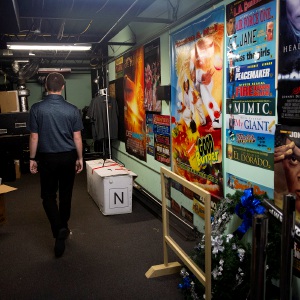 Claremont movie theater to close at end of May
Claremont movie theater to close at end of May
 Lebanon High senior comes to the aid of driver with health problem
Lebanon High senior comes to the aid of driver with health problem
 Editorial: Response to campus protests only adds fuel to the fire
Editorial: Response to campus protests only adds fuel to the fire
 Norwich author and educator sees schools as a reflection of communities
Norwich author and educator sees schools as a reflection of communities
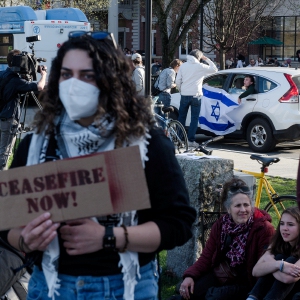 Dartmouth moves swiftly to stymie demonstration, leads to 90 arrests
Dartmouth moves swiftly to stymie demonstration, leads to 90 arrests
The housing crisis that Beilock acknowledged “pervades the entire Upper Valley community,” plays a role in mental and physical well-being too, she said. As such, the college will be doubling its investment in the Upper Valley Loan Fund, an employer-backed pool of cash that aims to create more affordable workforce housing, she said.
Dartmouth also now plans to secure 1,000 new beds for undergraduate, graduate, staff and faculty housing within the next decade, aiming to break ground on the first of these projects for each group within the next two years.
This week, the college announced that it would be extending child care subsidies to all benefits-eligible employees.
“We won’t stop there,” Beilock said from the stage. “Over the coming year, we will be partnering with Dartmouth Health and organizations across the Upper Valley to expand child care options.”
Her brick-and-mortar ambitions extend to intellectual infrastructure.
In what has already become a hallmark of Beilock’s mission, she spoke to the idea of “brave spaces,” where students can discuss controversial topics while letting “diversity of thought and lived experience shine through.”
“In a recent survey, a majority of college students thought free speech and diversity and inclusion were at odds with one another,” she said. “This couldn’t be farther from the truth. You can’t have the former without the latter.”
Next month, the college will launch the Dartmouth Dialogue Project, which will “intentionally teach the skills of open, honest and respectful communication, both in and out of the classroom,” she said.
In her own speech at the ceremony, Dartmouth Student Body President Jessica Chiriboga, a senior, framed these investments in the context of the college’s own history.
“Black students demonstrated against Dartmouth’s economic support of apartheid ... LGBT students fought against homophobia as the AIDS epidemic affected their family and friends,” she said. “If history is any guide, and from my own experience as a history major, I hope Dartmouth’s brave spaces implore students of different backgrounds to seriously consider others’ lived experiences.”
Additionally, Beilock announced a series of future “partnerships” between the college and various entities in the public and private sectors. Those include Dartmouth’s joining of a consortium aiming to bring more women across the country into the semiconductor industry, as well as the college’s creation of the Tribal Leadership Academy, which will “provide a place for experienced and newly elected tribal leaders to convene with one another,” she said.
Turning to Dartmouth’s environmental impact, Beilock suggested that the college’s long-standing — and sometimes-skewered — net-zero carbon emissions targets for 2030 and 2050 will be revamped, adding that in the next three years, the college will “invest over a quarter of a billion dollars into our campus decarbonization efforts to improve the efficiency of our buildings and install non-combustion technologies like heat pumps, geothermal and solar across campus.”
Dartmouth’s new president enumerated her plans — and how she’ll execute them — in front of the old guard, or the soon-to-be-so.
Hanlon, who introduced Beilock to the stage, was joined by another man headed out the door. New Hampshire Gov. Chris Sununu — the state’s governor has a place on the college’s board of trustees — reminded Beilock to “live free or die” from the podium.
“Go get it, have at it, have fun with it,” said the governor, who has announced he will be stepping down at the end of his term next year after eight years in office.
“The first rule of politics as a governor is to never wear a funny hat,” he said, pointing to the poofy ceremonial cap on his head. “So I guess it’s good I’m not running again.”
Dartmouth alumna and Hanover resident Viva Hardigg was excited for the new blood at the helm at Dartmouth, which is a significant influence within the Upper Valley community and the state.
“She’s animated, intelligent, brave and speaks her mind,” Hardigg said. “I believe she can continue the momentum that she came here with.”
Frances Mize is a Report for America corps leader. She can be reached at fmize@vnews.com or 603-727-3242.

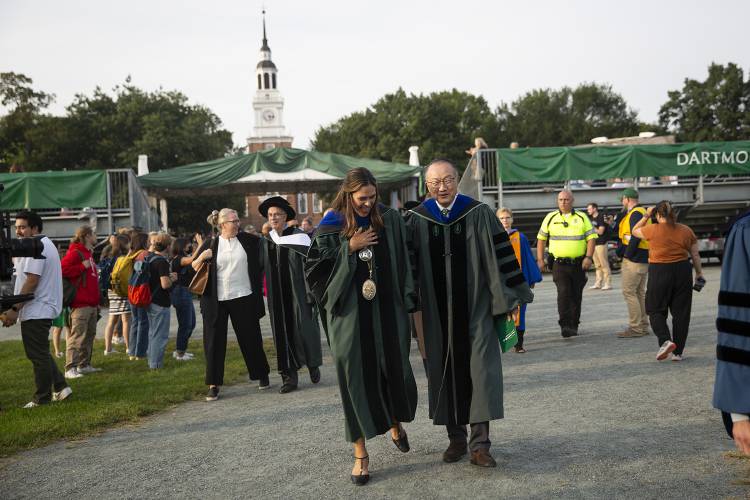
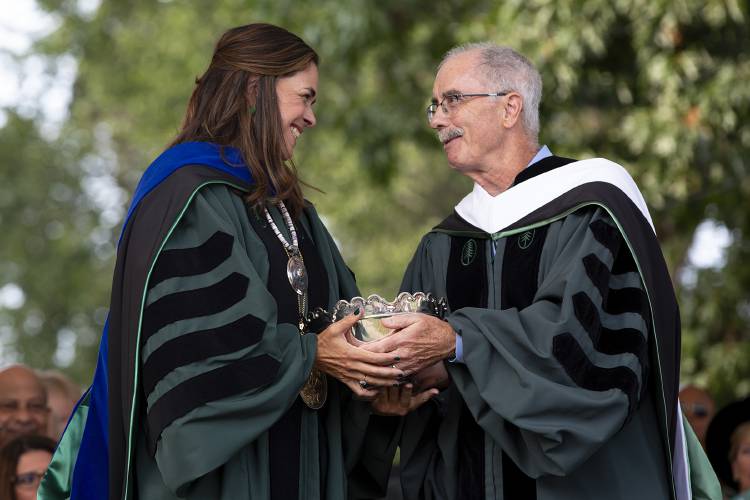
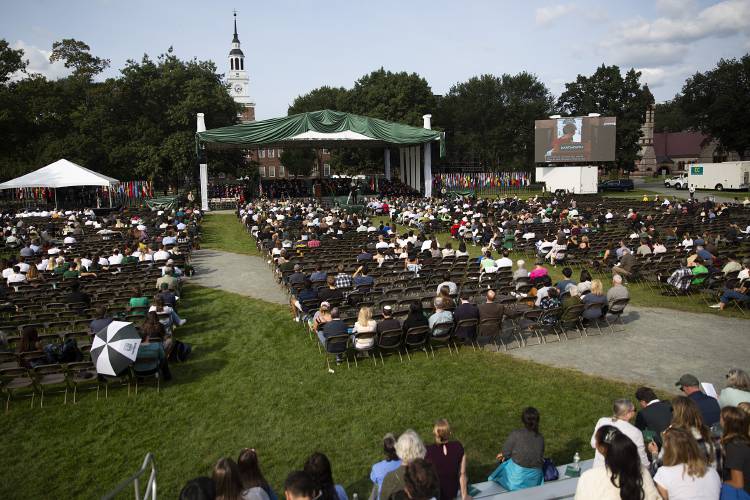
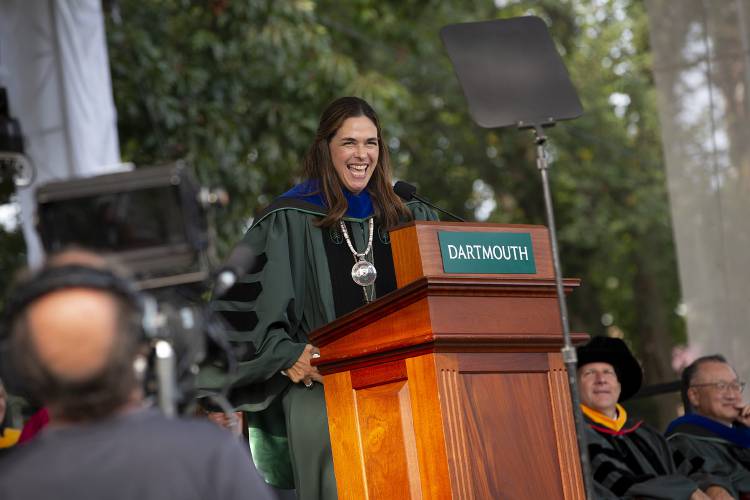
 Hartford Selectboard considers banner policy amid controversy over ‘Hometown Heroes’ project
Hartford Selectboard considers banner policy amid controversy over ‘Hometown Heroes’ project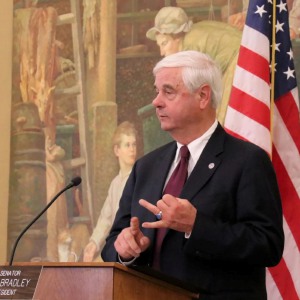 NH Senate President Jeb Bradley to retire after a 32-year career in politics
NH Senate President Jeb Bradley to retire after a 32-year career in politics
